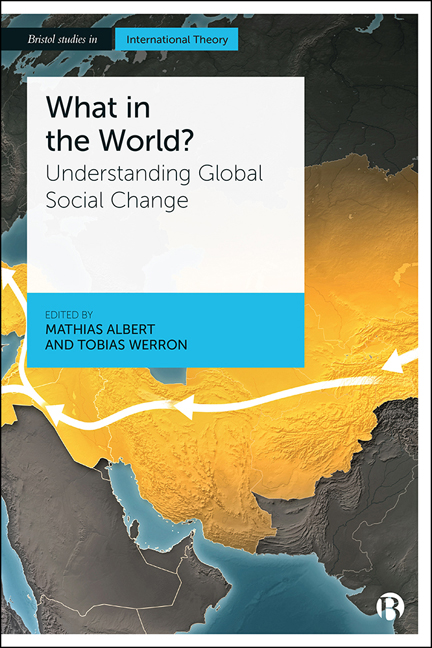Book contents
- Frontmatter
- Contents
- List of Figures and Tables
- Notes on Contributors
- Acknowledgements
- 1 Introduction: World Society and Its Histories – The Sociology and Global History of Global Social Change
- 2 Every Epoch, Time Frame or Date that Is Solid Melts into Air. Does It? The Entanglements of Global History and World Society
- 3 Periodization in Global History: The Productive Power of Comparing
- 4 Communication, Differentiation and the Evolution of World Society
- 5 Field Theory and Global Transformations in the Long Twentieth Century
- 6 Organization(s) of the World
- 7 Particularly Universal Encounters: Ethnographic Explorations into a Laboratory of World Society
- 8 From the First Sino-Roman War (That Never Happened) to Modern International-cum-Imperial Relations: Observing International Politics from an Evolution Theory Perspective
- 9 Nationalism as a Global Institution: A Historical-Sociological View
- 10 States and Markets: A Global Historical Sociology of Capitalist Governance
- 11 The Impact of Communications in Global History
- 12 The ‘Long Twentieth Century’ and the Making of World Trade Law
- 13 Third-Party Actors, Transparency and Global Military Affairs
- 14 Technical Internationalism and Global Social Change: A Critical Look at the Historiography of the United Nations
- References
- Index
7 - Particularly Universal Encounters: Ethnographic Explorations into a Laboratory of World Society
Published online by Cambridge University Press: 22 December 2021
- Frontmatter
- Contents
- List of Figures and Tables
- Notes on Contributors
- Acknowledgements
- 1 Introduction: World Society and Its Histories – The Sociology and Global History of Global Social Change
- 2 Every Epoch, Time Frame or Date that Is Solid Melts into Air. Does It? The Entanglements of Global History and World Society
- 3 Periodization in Global History: The Productive Power of Comparing
- 4 Communication, Differentiation and the Evolution of World Society
- 5 Field Theory and Global Transformations in the Long Twentieth Century
- 6 Organization(s) of the World
- 7 Particularly Universal Encounters: Ethnographic Explorations into a Laboratory of World Society
- 8 From the First Sino-Roman War (That Never Happened) to Modern International-cum-Imperial Relations: Observing International Politics from an Evolution Theory Perspective
- 9 Nationalism as a Global Institution: A Historical-Sociological View
- 10 States and Markets: A Global Historical Sociology of Capitalist Governance
- 11 The Impact of Communications in Global History
- 12 The ‘Long Twentieth Century’ and the Making of World Trade Law
- 13 Third-Party Actors, Transparency and Global Military Affairs
- 14 Technical Internationalism and Global Social Change: A Critical Look at the Historiography of the United Nations
- References
- Index
Summary
Introduction
This chapter explores the relevance of experimental action and experiences in the dynamics of global social change. It does so by looking at a type of experimental setting that is of major relevance in world politics: international military and humanitarian interventions in armed conflicts. Launched in perceived emergency situations, such interventions try to create large-scale political, societal and economic change under conditions of conflict, violence and insecurity. At stake in such constellations is more than the society that is being intervened upon. It is global order itself. Societies subject to intervention are ‘laboratories of world society’. In them an abstract and global epistemic, normative and political order comes to be enacted, stabilized, and made negotiable in human interaction, which makes them productive fields for the study of social change in world society. This chapter will pursue that idea here, looking at the intervention in Afghanistan (2001) and basing the argument on ethnographic fieldwork carried out in and around Kabul in 2015. The chapter speaks to theoretical debates on change in world society as well as to discussions about the role and potential of ethnographic research in studying global orders and relations.
Experiments inside and outside of research settings are attracting increasing attention in the social sciences. Driven in part by the mainstreaming of science and technology studies, in part by an ever more acute awareness of hitherto unknown global problems, experimental forms of action have once more become a relevant topic within the social sciences as well as among policy makers (see, for example, Stiegler and Werner, 2016; Bogusz, 2018; Engels et al, 2019). The notion of the ‘laboratory’ – or, more frequently, the ‘lab’ – has gained prominence not only in technology-driven fields of policy making, but basically everywhere where actors try to signal that they are working on issues relating to the ‘grand societal challenges’ of our time. Though in many instances the notion of the ‘lab’ might be no more than a fashionable cue for innovative thought, it is also of conceptual relevance when thinking about change in contemporary societies. Traditionally, the laboratory used to be a place where knowledge was generated through the manipulation of things and processes in a controlled environment.
- Type
- Chapter
- Information
- What in the World?Understanding Global Social Change, pp. 117 - 138Publisher: Bristol University PressPrint publication year: 2020



